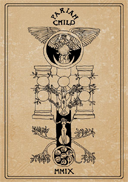Faith: “Decades of Despair” CD

The more I ponder the band the clearer its two faces become. The first, the live side, is direct. Loud and proud. The folk roots integral. Not remotely at odds with their sweaty ’80s past. These traditions are combined with gusto, in the moment, before slipping into memory. The second, which should be the more familiar side, is somehow less so. Forged through labour in the studio, the results continue to be considerably different. This is where the maverick spirit is let loose. Genuinely unhindered by any preconceived notion of what should be, each album stands defiantly alone. Another moment in time yet still Faith through and through.
Having witnessed them on stage, I had forgotten that the two faces served different purposes. Then as I embraced the record for what it was it began to make sense again. “Decades of Despair” is a mammoth journey and with the opening title track clocking in at eleven minutes. But do not let the length in itself deter. Neither monotonous nor repetitive, the dark orchestral ambience is melancholic and assured. That lead break before the vocals enter the fray is inspired too. Christer Nilsson embodies all that Faith stands for. Passion. Frustration. Intelligence. And heartache. Very human, he means what he sings and it makes this all the more captivating.
As the album unfolds, there are common themes and tones albeit with unexpected detours. “Iscariot” begins with a similarly steady pace yet Christer’s vocals are echoed by a gang chorus. It’s disarming and infectious. “Hwila” is haunting. The piano chords speak of solitude and Martina Fagerstrom of fragility. “BoEves Psalm” suddenly lifts the sombre veil with a fresh folk air underpinned with Heavy Metal punch. The brooding plod continues in “Ashes To Ashes” whereas the muffled “Hollow” has a distant vocal effect and a spine-tingling solo early in proceedings before a haunting piano refrain melts into the menacing song proper. The solo that breaks after the heaving riffing in “Marion Crane” is stellar too. Folk comes to the fore again with the bittersweet sadness of “Stums Polska” and “Codex Dei” is remarkable for the Nyckelharpa passage played over the Lord’s Prayer, a hazy Eastern vibe, which is then offset by a lively jig on the violin, followed by piano put to almost childlike singing. Orthodox this is not. Then with a crooked smile, the album closes an unusually relaxed rendition of “What a Wonderful World”…
Suffice to say, this will be too strange, slow-burning and genuinely progressive for most. Four albums in, it’s personal and not going to change.

 Scriptures
Scriptures 